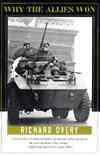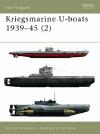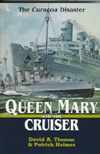Why the Allies Won
Overy, Richard
1997, W W Norton & Co
ISBN 039331619X
Paperback, 428 pages, reprint from 1995. 31 photos, 11 maps
| Type. | General History |
| Pros. | Ideas clearly presented and based on solid research |
| Cons. | None to speak of |
| Rating. |  |
 This excellent book provides an analysis of the factors that led to the Allies' victory in World War II. Four "zones of conflict" are discussed, among them the war at sea, including the Battle of the Atlantic. In addition, four "themes" are explored in the context of their impact on the course and eventual outcome of the war.
This excellent book provides an analysis of the factors that led to the Allies' victory in World War II. Four "zones of conflict" are discussed, among them the war at sea, including the Battle of the Atlantic. In addition, four "themes" are explored in the context of their impact on the course and eventual outcome of the war.
The book's most valuable contribution is that it emphasizes the real uncertainty as to who would emerge the victor in World War II - an uncertainty that is easily overlooked when looking back on the war as a discrete continuum of events with an established beginning and end that tend to make the outcome seem preordained. The author begins by pointing out that, although it may seem surprising to generations born after the conflict, the outcome of World War II hung in the balance at many stages. He also analyzes several common but faulty misconceptions, for instance, that the Allies fought for democracy and to make the world safe for democracy (this idea conveniently ignores the presence of Communist Soviet Union on the Allied side), and that the numerical superiority of the Allies once the Soviets and Americans joined the conflict was a certain indicator of victory (discounting questions of quality versus quantity, efficient use and transport of supplies, and similar issues).
The coverage of the war at sea is accurate and incisive. This chapter embraces naval actions in all theaters 1939-1945, but devotes a section to the U-boat war in particular. The overall course of the U-boat war, including turning points, setbacks, technological innovations, cryptographic developments and intelligence coups, and strategy and tactics, is presented in clear and concise language, providing a useful overview in just 15 pages.
The other "zones of conflict" are Stalingrad and the Eastern Front; bombing campaigns and use of air power; and the invasion of Normandy and the subsequent re-conquest of Europe by the Allies. In each case, the inauspicious beginnings and reversals which made the outcomes unclear to those in the thick of it are recounted in detail. The "themes" are the economies associated with war, including mass production; technology - how and to what extent it was developed and utilized on both sides; leadership and alliances; and a comparison of the moral bases of the war on all sides. The first two themes are especially relevant to the U-boat war.
The book ends with a brief examination of the postwar years, including the Cold War; the spread of Communism and the ultimate demise of that system; and the realignment of former Axis nations against the Soviet Union.
An insightful work of scholarship that challenges some of the preconceptions held by many about the Second World War.
Review written by Tonya Allen.
Published on 29 Jan 2000.
This title is highly recommended.
Return to our main review page.



